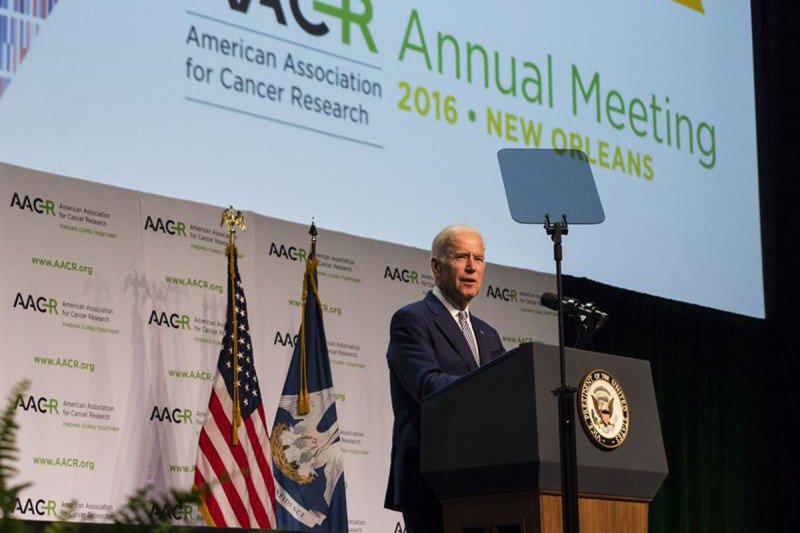
Vice President Joe Biden addressed members of the American Association for Cancer Research on Wednesday in New Orleans.
On Wednesday, at the closing session of the 2016 American Association for Cancer Research (AACR) annual meeting, held this year in New Orleans, Vice President Joe Biden and Jill Biden thanked the assembled group of cancer researchers for their work and urged collaboration to “end cancer as we know it.”
“You’ve given humanity a sense of hope — and, I might add, expectation,” the vice president told the crowd of more than 4,000 scientists, who had just spent the past five days presenting and discussing the latest advances in cancer research.
Referring to the many recent breakthroughs — especially in immunotherapy — that have improved the lives of people with cancer, Mr. Biden said he believed we are on the cusp of a new era in cancer treatment. He urged researchers to “break down silos” and collaborate on projects, so that “we can make a decade’s worth of progress in five years.”
The vice president has made cancer a focus since President Obama announced a new “cancer moonshot” in his last State of the Union address and put Mr. Biden in charge of “mission control.”
Earlier this year, Mr. Biden met with several members of Memorial Sloan Kettering’s leadership at the World Economic Forum in Davos, Switzerland, to discuss ways to make progress on the moonshot initiative.
“This is personal for us, but it’s also bigger than us,” Dr. Biden said in her remarks. The Bidens lost their son Beau in 2015 from a rare brain cancer called glioblastoma.
Increased Funding
Mr. Biden drew attention to the financial difficulties confronting scientists who pursue research, pointing out that many of them routinely spend a third of their time applying for grants and seeking money to keep their lab running.
“That’s like asking Derek Jeter to take several years off to sell bonds to build Yankee Stadium,” he said.
Mr. Biden helped broker $2 billion in additional funding for the National Institutes of Health for fiscal year 2016. But he faulted the federal government for taking more than a year to review grant applications and for shying away from funding “outside-the-box” thinking.
In preparation for recommendations he will make to the president and to Congress, Mr. Biden asked the assembled scientists to take a hard look at their field and to come to him with an “honest evaluation of changes that could be made.”
“You are the very best we have,” the vice president said. “We need you badly. We need some guidance on how to make your job, not easier, but more likely to meet your ends.”
As part of the moonshot initiative, the National Cancer Institute launched an online engagement platform to enable the research community and the public to submit cancer research ideas, which will be vetted by a Blue Ribbon Panel of scientific experts, including MSK’s own Dr. Sawyers.
Read our highlights from the first and second half of AACR.


